Hot Stuff: Five new romances tackle the struggle to feel deserving of love
Many of us struggle with feeling like we’re not enough, or that some piece of us makes us undeserving of love. It’s a common obstacle for the protagonists of romance novels, one that’s employed to exquisite success in five new romances released this November. The reasons are myriad: past trauma, chronic illness, longstanding friendship, and so much more. Romances are not only tales of love between partners, but paeans to self-love. These five titles are a gorgeous testament to how one only comes with the other.
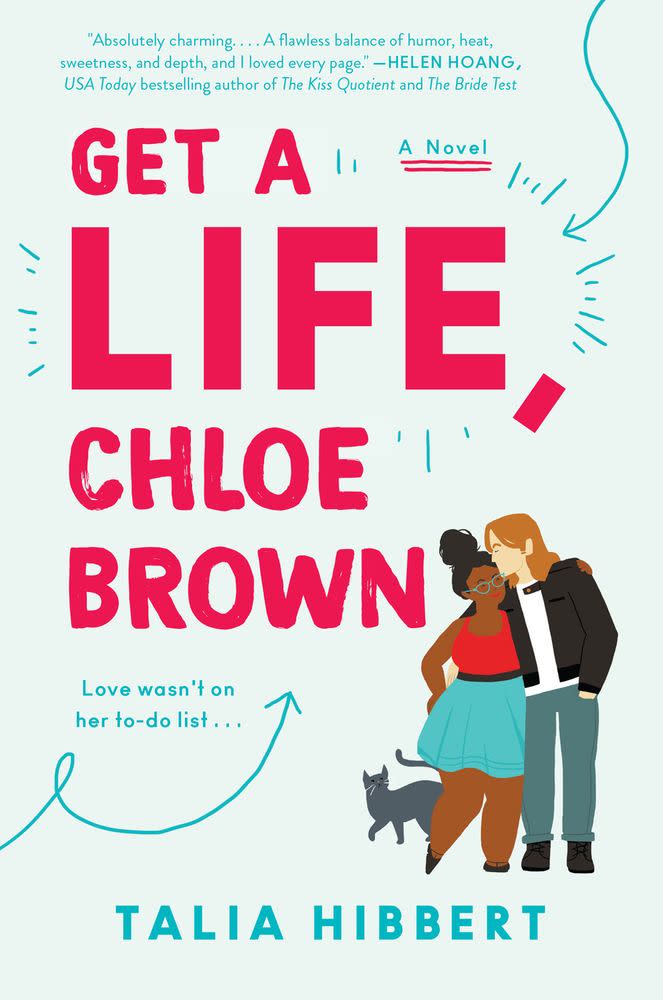
Get a Life, Chloe Brown
By Talia Hibbert
Review: Sometimes a book can change your life. It can turn you upside down and shake everything up and spit you back out with all your bits and bobs rearranged to give you a more complete picture of yourself than you’ve ever had before. That was my experience reading Get a Life, Chloe Brown. We don’t often get incredibly personal in critical reviews here, but Hibbert’s novel can’t help but be personal for me — like Chloe Brown, I have fibromyalgia. It’s an invisible illness, one that means you can look like a twee picture of retro perfection on the outside and feel like the fire salamanders from Harry Potter are eating you alive on the inside. Get a Life, Chloe Brown chronicles this in unflinching fashion, all the while making it clear that the limitations of your illness should never be a burden to those who are supposed to love you most. After a brush with death, Chloe makes herself a “get a life” list, determined to get herself out of the bubble of fear and caution she’s lived in since her diagnosis turned her life topsy-turvy. Step one is moving into a flat of her own, where she is annoyed by and attracted to superintendent Redford “Red” Morgan in equal measure. Red is nursing his own wounds, rediscovering himself after surviving the trials of an abusive relationship. Though the two initially volley in discord, they quickly find themselves drawn to each other, finding something healing and essential in the soft space they give each other to land. Hibbert herself has chronic illness/pain, and she breathes that life experience into exquisite, bruising detail on the page. Her descriptions of Chloe’s pain, the life hacks she’s developed just to get through the day, and Chloe’s struggles to reclaim her joy are a breathless blend of heartbreaking truths and hilarious laugh-through-the-pain humor. In the same paragraph, Hibbert can punch in the gut with her spot-on, lyrical summation of the lived experience of chronic pain, forcing you to understand parts of yourself you’d hitherto left unexamined, all the while never losing sight of the delightful absurdity of life. If you don’t have a chronic illness, it’s still essential, empathetic reading. I want to pass out copies of this book to everyone I’ve ever met because it’s a textbook on how to have compassion for yourself and those you love most. It breaks down the peculiarities of invisible wounds, whether they come from your body’s own betrayal or the scars inflicted by the cruelty of others. Hibbert does all this while also constantly infusing the novel with a fizzy, intoxicating sense of humor that bubbles off the page. Her characters are vital in both their pain and their pleasure, their vibrancy an infusion of life and laughter that is an infectious delight. You want to luxuriate in Chloe and Red’s lives, soaking up their essence, falling every bit in love with them as you do with each other. And if you can forgive their foibles, empathize with their pain, and root for their happy ending, why should you not grant the same to yourself? With Get a Life, Chloe Brown, Hibbert suffuses her novel with the gift of self-love, one that comes with an internal recovery only made better but not precipitated by those who fill the gaps within ourselves. Hibbert’s novel is a life-affirming, soul-searching, beautiful gem of a book that should be required reading for anyone in search of their own happily-ever-after. It’s a resounding, triumphant testament to the power of healing, the beauty of love, and the essential nature of compassion. May we all get a life, and a love, like Chloe Brown.
Heat Rating: 🔥🔥🔥🔥
Grade: A+
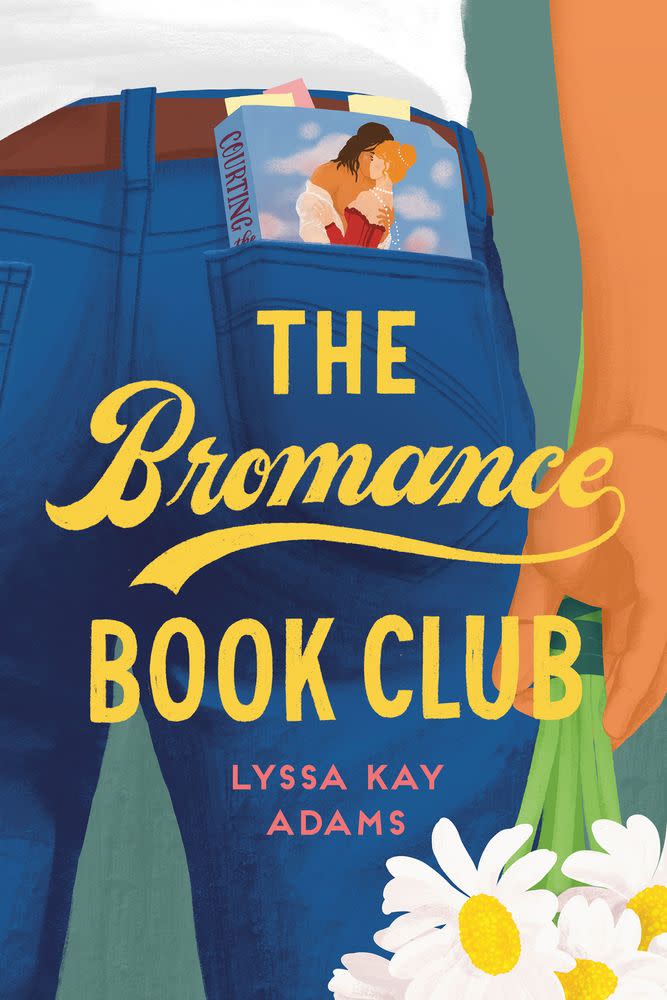
The Bromance Book Club
By Lyssa Kay Adams
Review: Lyssa Kay Adams hits a home run when it comes to the most inventive, refreshing concept in rom-coms this year. After discovering that his wife has been faking it their entire relationship, Gavin Scott’s marriage is in trouble. Enter the Bromance Book Club: a group of local guys, including his best friend and professional baseball teammate Del, who read and love romance. But not only that, they are a group of men who have taken the lessons and precepts of romance, particularly its insight into the female psyche, as a way to save their own relationships. With the help of Courting the Countess and his fellow book club members, Gavin resolves to win Thea back. But he’ll discover it takes so much more than what romance has to offer on a surface level to forge the true bonds of an enduring happy-ever-after. Romance lovers might balk at the notion of a group of professional male athletes reading romance, fearing becoming the butt of the joke. But Adams treads the line of celebrating the tropes and flowery dialogue of historical romance without ever veering into stereotypes or any sense of mockery. Instead, she turns that pitfall on its head, picking up beloved arguments about romance, like the genre’s inherent feminism, the sexism of not believing women can distinguish between reality and fantasy, and more. She puts these defenses of the genre in the mouths of her burly, hilarious cast of guys to warm effect. The Bromance Book Club is a gloriously tongue-in-cheek celebration of all the things that make romance so entertaining. Lovers of the genre will scream with delight as the book club members unironically use concepts like “backstory” and “the grand gesture” to outline a playbook for what Gavin needs to do to truly win Thea over. It’s an added bonus that Adams includes excerpts from Courting the Countess, allowing us to read along with Gavin and track the parallels between the historical romance novel and his own story. Adams does all this meta-maneuvering while still offering up a genuinely steamy and emotional romance between two people who must find the courage to show their vulnerabilities to each other. It might feel odd to delve into a contemporary romance with a heroine hell-bent on divorce for a significant chunk of the beginning, but Adams crafts one of the best second-chance romances of the year from inside this marriage. Gavin and Thea have been living on the surface for nearly all their marriage, masking their true hurts and desires for the purpose of propriety and people-pleasing. But when the two finally learn to chase what they want and expose the most intimate parts of themselves, they rekindle a spark they thought lost. Adams offers a divine picture of how even those who seem to have found their HEA can be faking it, reminding us of the hard work, communication, and vulnerability it to takes to make any relationship work. She understands the most crucial underpinnings of romance. While steamy sex and squee-inducing tropes might be the packaging we love most, they mean nothing without a deep well of emotion beneath the surface that offer up truths about intimacy, self-love, and partnership. Like any great work of fiction, the best of romance gives us the space for self-examination, offering readers the chance to assess what they desire and deserve. Adams does this in spades, hitting the sweet spot between meta ode to romance novels and heartfelt love story. The Bromance Book Club is a grand slam of a novel, stepping up to the plate with equal measures of humor and heart to knock it out of the park.
Heat Rating: 🔥🔥🔥🔥🔥
Grade: A-
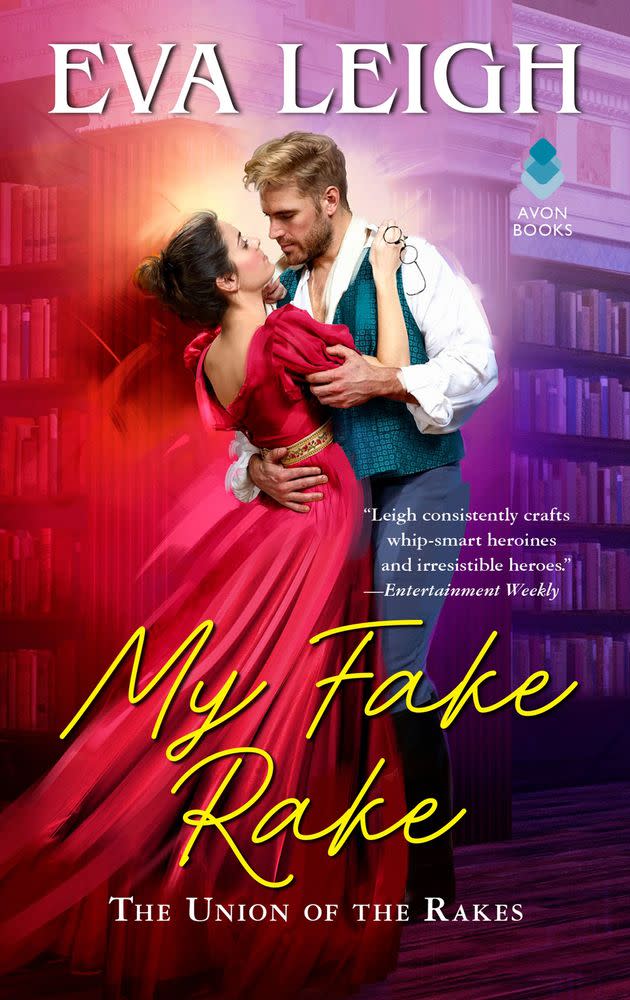
My Fake Rake
By Eva Leigh
Review: With the divinely charming My Fake Rake, Eva Leigh launches her new series, The Union of the Rakes, inspired by some of the 1980s’ most iconic rom-coms, with a Regency twist. Move over, John Hughes. Leigh is here to steamroll the more problematic aspects of the era with a genuine affection for the source material, never shaded by the rose-colored glasses of nostalgia. Grace Wyatt has always been content with her wallflower status, preferring to dedicate her energy to more scholarly pursuits. But when her crush Mason Fredericks announces he’s on the hunt for a wife, she is determined to make him think of her as more than a spirited colleague in the sciences. To that end, she recruits her best friend, Sebastian Holloway, to transform him from bespectacled nerd to glorious rake. If he succeeds in faking it till he makes it as a rake, Grace is convinced she can change Mason’s perception of her. Grace and Sebastian are the two of the most glorious dummies ever to grace the pages of a romance novel. They have heaps of book smarts, but faced with the prospect that their best friend might have true feelings for them (even after they get it on!), they can’t fathom that it’s anything more than lust in the heat of the moment. Leigh expertly crafts their growing affection that blooms into love, tiptoeing to the edge of their realization of their potential for perfect happiness and drawing them back from it with an adroitly paced push-and-pull. More than anything, Leigh nails Sebastian’s transformation. The makeover trope is one of the more tired and problematic of the rom-com genre, but Leigh ingeniously turns it on its head, swapping the genders and making Sebastian’s transformation more about social commentary than anything else. Yes, any self-respecting romance reader will swoon at the image of Grace yanking off Sebastian’s spectacles and seeing his hitherto unrealized Viking good looks beneath. It’s also subtly hilarious because of Leigh’s ability to tap into and send up the sexist history of just such a moment (she takes off her glasses and voila, she’s hot!). Seb is an anthropologist, and he only agrees to this ridiculous charade with the intention of using his travails in society to gather research on the customs and rules of the English nobility. As a result, he, Grace, and their other partner in crime, the Duke of Rotherby, routinely satirize the aristocracy and their obsession with appearances. In a way, Leigh gets to put the entire foundation of the traditional historical romance on notice. She sees your thinly veiled racist obsessions with accuracy and the tropes of yore, and she is here to burn them to the ground, making you laugh the whole way. Throughout their social experiment, Grace gains self-confidence and a sense of empowerment, while Seb learns valuable tools for coping with his social anxiety. For anyone who struggles with anxiety or self-worth, both Grace and Seb’s journeys will feel devastatingly real and immensely inspiring (guess who employed Seb’s anxiety coping mechanisms at a party last week?). Grace is a fiery heroine, unwilling to let anyone else dictate her own destiny. We stan a heroine who goes to the extremes of turning her best friend into a hunky fake rake purely to make another man realize she’s a woman. Grace’s empowerment and her commitment to claiming what she wants is softened by her innate kindness. The care and consideration which she displays for Sebastian (and everyone in her life) only grow with her self-confidence. Similarly, Seb is a gooey cinnamon roll of a beta hero. One who so respects Grace’s whims and wants that he nearly loses her forever, all for the sake of being a good man. Nothing is more swoon-worthy than his inviolable sense of respect for Grace, not just as a woman, but as a human being. Sebastian may be a fake rake, but our love for these two romantic dunces and their satirical, slow-burn, sexy ruse is nothing but genuine.
Heat Rating: 🔥🔥🔥🔥
Grade: A-
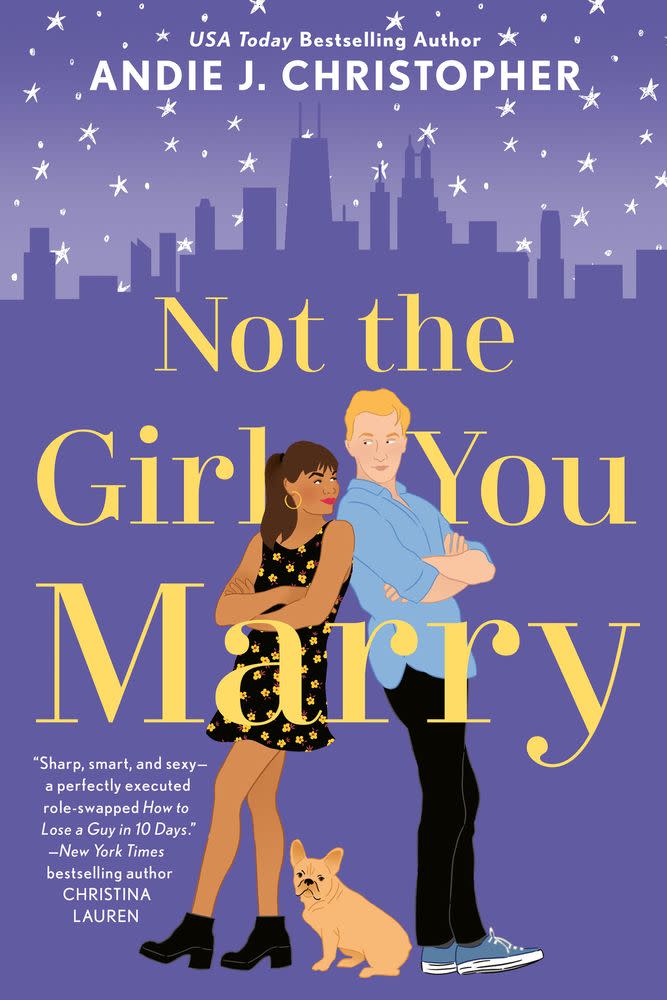
Not the Girl You Marry
By Andie J. Christopher
Review: Andie J. Christopher delivers a gender-flipped take on How to Lose a Guy in 10 Days that, ultimately, is all about accepting you are enough so you can make space for the love you deserve. Hannah Mayfield is a whip-smart event planner and a fierce woman who’s convinced herself that her love of sex, her filthy mouth, and her biracial identity have made her into the type of woman who is “not the girl you marry.” It doesn’t help that her snooty ex-boyfriend told her precisely that. In contrast, Jack Nolan is a dashing gentleman with just enough cocksureness to make him sexy. He believes himself the perfect boyfriend, in spite of being persistently unlucky in love. The two have an instant connection when they meet and spar one night at a bar, but they’ll put that roaring chemistry to the test with lies and deception. To get a promotion, Hannah needs to prove to her boss she can be romantic, by keeping a boyfriend for at least two weeks; similarly, Jack is offered a shot at making the move from being the fluff how-to guy at his magazine to covering politics — if he’ll write a final column on how to lose a girl. How to Lose a Guy in 10 Days was never not problematic, its romance overshadowed by its basis in gender stereotypes meant to make women feel guilty about being too much. Christopher softens the edges of it by swapping the genders: Things like mansplaining and sending dick pics are sadly all too frequent and excellent, completely justifiable fodder for breakups. But it’s still a bit hard to swallow the lies they tell each other, even if they’re based in old wounds and an aching need to find meaning in professional success. It’s a testament to Christopher’s ample skill as a writer that she largely manages to transcend that deception. Hannah and Jack justify their duplicity with the deep-seated belief that this relationship isn’t meant to last because of something inherently wrong with them. It’s heartbreaking to watch them navigate their perceived shortcomings, unable to love themselves as much as those around them. Christopher plumbs this very real sense of never feeling enough, all while coating the book in her signature pull-no-punches humor. As a writer, she’s bawdy, warm, outrageous even, and all those colors swirl off the page, lending her an utterly distinctive voice. From her references to the University of Notre Dame and college football rivalries to her apt portrait of lapsed Catholicism, Christopher litters the book with idiosyncratic details that bring it vibrantly to life and lace the humor with something deliciously personal. Women often have to grapple with being too much — the sense that we’re too high-maintenance, too demanding, too lusty, too clingy, too bitchy, too fat, too everything. Christopher delves into this, forcing Hannah to unpick the thought patterns that have led her to believe she doesn’t deserve a happily-ever-after. It can hit close to home for any who might have absorbed similar beliefs. Hannah is what some might deem “unlikable,” purely because she’s not willing to compromise who she is for a man and not afraid to call people on their B.S. Not to mention, she’s willing to do whatever necessary to succeed in her profession, behavior that could read as badass or bitchy depending on who you ask. But what Hannah really is, is real, honest, and refreshing. For those of us who’ve spent years trying to be likable or worrying that we’re too loud, too bawdy, too whatever, it’s freeing to read about a woman going through the same struggle and a partner loving her exactly as she is. It’s a release, a promise that maybe we some day too can find our own version of Jack Nolan. And this is what romance does best — allows you to escape into a love story that holds a mirror up to your own insecurities. It offers up men and women able to love and be loved wholly as themselves. Christopher’s work is one of those laughing through your tears books, a laugh-out-loud romp with depth that unflinchingly peers into the soul of any woman who’s ever felt the double-edged sword of their muchness making certain they’ll never be enough. So maybe Christopher should just redo all our problematic rom-coms from now on?
Heat Rating: 🔥🔥🔥🔥🔥
Grade: B+
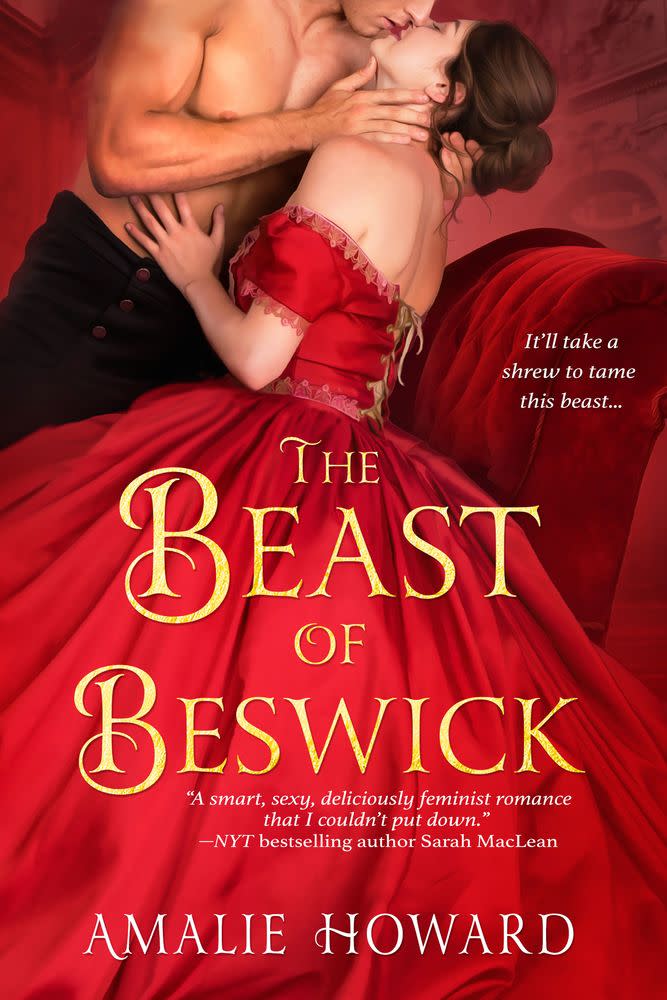
The Beast of Beswick
By Amalie Howard
Review: If you’ve ever thought to yourself, “The Taming of the Shrew is great, but I wish it had less misogyny and more fairy-tale vibes,” then you’re in luck. Enter The Beast of Beswick, a Regency-era take on Beauty and the Beast with some serious heat and crackling banter. Lady Astrid Everleigh has spent years on the shelf thanks to a malicious invented scandal, but the stridently feminist Astrid decides to take matters into her own hands when it comes to protecting her younger sister from her fortune-hunting uncle and a lascivious aristocrat. To that end, she seeks salvation in the form of marriage with the so-called Beast of Beswick, Thane, a duke who has been badly scarred after nearly dying at the hands of several bayonets in the Napoleonic Wars. The two initially spar relentlessly in a relationship forged only by convenience, but underneath that constant back-and-forth is a current of attraction. As the two struggle to save Astrid’s sister (who is far smarter than her sister thinks), they play a game of romantic cat-and-mouse. Both Astrid and Thane suffer from wounds far deeper than his external scars, believing themselves undeserving of love. But Astrid is an assertive, fierce heroine, one who prizes her intellectual prowess as much as her skill as a horsewoman. In short, she’s everything Thane craves and needs: a woman who will fight for him when he is prepared to withdraw from society and the possibility of love entirely. In many ways, Thane is a beast — not because of his scars, but because of his foul temperament, a study in how men often turn to aggression and anger rather than allow any chink of vulnerability in their armor. But Astrid is adept at finding the weak spots in that armor and at tearing it from Thane piece by piece. She’s one of the most sharp-tongued, vivacious heroines of the year, blooming with passion for her sister, her commitment to equal rights for women, and her love of learning. Astrid hews to ideas that earn her the label of bluestocking, but Howard makes those qualities utterly desirable in Thane’s eyes. She’s hot-blooded and equally as temperamental as Thane, and it’s divine to have a historical heroine so outspoken and deliciously committed to the tenets of Mary Wollstonecraft and her ilk. Howard never shies away from making Astrid a tornado of emotional fortitude and ferocity and Thane a wounded animal. It’s her reluctance to sharpen the edges of these two protagonists, cast off by society, that makes them such an engaging pair. There’s an electricity to their clashes, a sense that you don’t know what the other will do next — without tipping into the worst excesses of alpha heroism or making them truly loose cannons. Howard takes an unblinking approach to her characters, reveling in their complexities and outrageousness. They are marvelously excessive. Nowhere is this more on display than in Thane’s Aunt Mabel, an aging widow who devours footmen (and any other attractive, available men in her vicinity) for breakfast. There’s a sauciness and frankness to Howard’s world that is irresistible. The book falters somewhat in its conclusion — the final resolution between Astrid and Thane feels no more significant than any of their previous back-and-forths. For a couple whose relationship is predicated on sequences of closeness and withdrawal, what clinches their happiness needs to be as outsized as their personas. Still, The Beast of Beswick is a necessary read for anyone who craves a smart, feminist romance in their lives. Howard may not quite stick the landing (though don’t get me wrong, it’s still enchanting), but the journey is so bursting with shrewd banter, inventively sexy interludes, and emotion with a capital E that it almost doesn’t matter.
Heat Rating: 🔥🔥🔥🔥🔥
Grade: B+
Related content:

